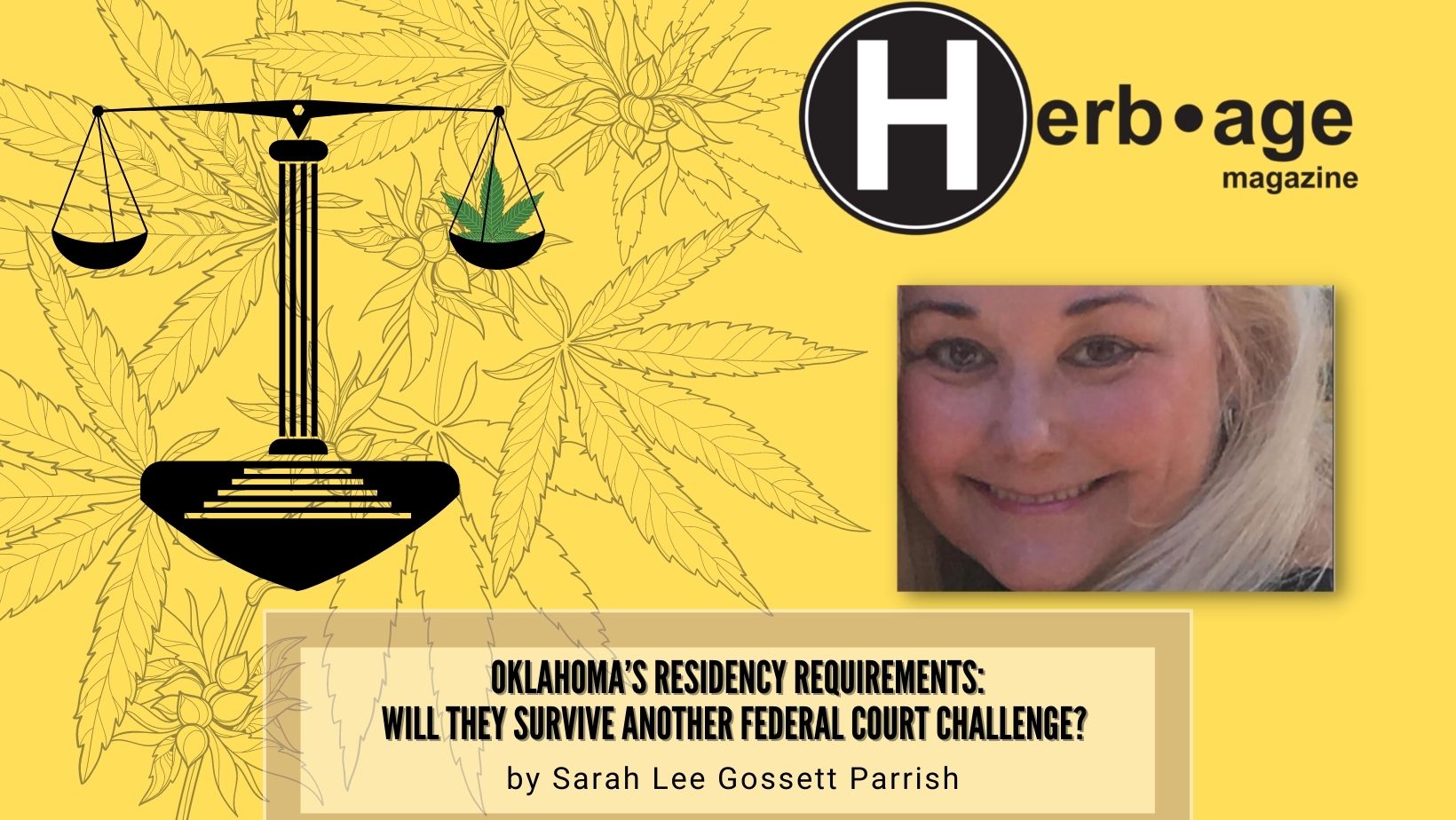OKLAHOMA’S RESIDENCY REQUIREMENTS:
WILL THEY SURVIVE ANOTHER FEDERAL COURT CHALLENGE?
by Sarah Lee Gossett Parrish,
Cannabis Lawyer
I previously explored Oklahoma’s residency requirements applicable to medical marijuana business licensees in my article, “ARE OMMA’S RESIDENCY REQUIREMENTS UNCONSTITUTIONAL?”, where I commented on the change in residency requirements for OMMA licensees imposed by the Oklahoma Medical Marijuana and Patient Protection Act, nicknamed the Unity Bill (“UNITY”), which Oklahoma Governor Kevin Stitt signed into law on March 14, 2019, and became effective on August 29, 2019.
UNITY changed the residency requirements for OMMA licensees from the simple, easily-met standard in SQ 788, which required applicants to “show residency in the State of Oklahoma” by producing an Oklahoma state driver’s license, identification card, residential lease, mortgage, deed, or similar document, to a strict, two-year residency requirement or five years of continuous Oklahoma residency during the preceding 25 years immediately prior to the application date. Additional, substantial, documentary evidence has been required as proof, ever since.
As I previously observed, federal district courts across the country have started to invalidate residency requirements for cannabis business licensees on the basis that such protectionist statutes violate the dormant Commerce Clause of the United States Constitution (U.S. CONST. ART. I, § 8, cl. 3.), by explicitly and purposefully favoring state residents over non-residents. Indeed, this is the purpose of Oklahoma’s residency requirements set forth in UNITY, as well as the preexisting 75% Oklahoma ownership requirement.
At the time of my original article, an action had recently been filed in the United States District Court for the Western District of Oklahoma (where I served as a federal law clerk just after I first finished law school), by a Washington limited liability company, Original Investments, LLC d/b/a Dank’s Wonder Emporium. That legal battle concluded in June 2021 with United States District Judge Stephen Friot’s dismissal with prejudice of the action by relying on the federally-illegal status of marijuana under the Controlled Substance Act (codified in Title 21 of the United States Code). Specifically, Judge Friot refused to “facilitate the plainly criminal activity in which plaintiff proposes to engage in the State of Oklahoma.”
Nationally, the battle continues. In early October 2021, a case filed in the Maine federal district court, NPG v. Maine Department of Administrative and Financial Services, where the court struck down Maine’s residency requirements for marijuana business licensees as violative of the dormant Commerce Clause of the United States Constitution (despite the fact marijuana remains federally illegal), made its way to the United States Court of Appeals for the First Circuit, as the first federal case to reach a United States Court of Appeals, a feat which is no small matter in legal circles.
The NPG decision and its appeal occurred months after Maine had settled a similar federal action alleging Maine’s residency requirement violated the dormant Commerce Clause, by declaring Maine’s cannabis regulators simply would no longer enforce the residency requirement.
Notably, Maine U.S. District Judge Nancy Torrensen, who handed down the NPG decision, stayed her own injunction barring Maine regulators from enforcing the residency requirement, opining that long-term consequences could result if regulators were forced to grant cannabis licenses to non-residents pending appeal, and if the First Circuit reversed her decision.
Regardless of the outcome, it is clear that the First Circuit’s opinion in NPG will prove instructive for other federal courts in the country, given the lack of precedent from any other federal appellate court on the issue.
In the interim, federal district courts are taking notice. For example, earlier in October, U.S. District Judge Nanette Laughrey of the Western District of Missouri ordered a permanent injunction overturning Missouri’s residency requirements for cannabis licensees after an eight- minute bench trial in Toigo v. DHSS.
So…what’s the take-away?
Oklahoma has not seen the last of federal court challenges to its residency requirements for OMMA licensees.
Information contained herein provides general information related to the law and does not provide legal advice. It is recommended that readers consult their personal lawyer if they want legal advice. No attorney-client or confidential relationship exists or is formed between you and Ms. Parrish as a result of this article.




